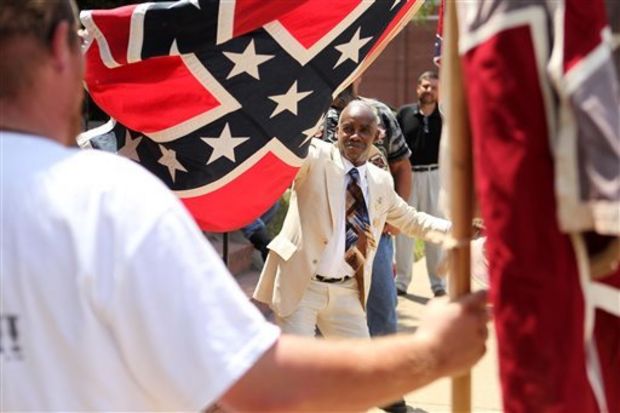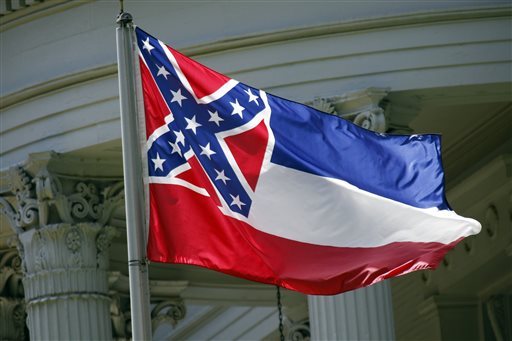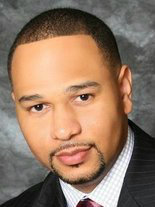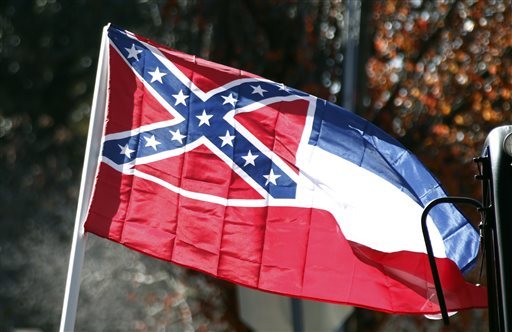

JACKSON, Mississippi (AP) — On a sidewalk outside the Mississippi Governor’s Mansion on a hot summer’s evening, an interracial group of about 80 people prayed for state leaders to remove the Confederate battle emblem from the state flag.
The Rev. Rosie Jackson of Covington County, with the South Mississippi Conference of the African Methodist Episcopal Zion Church, called the flag a divisive symbol that represents the worst parts of the state’s history — slavery, segregation and the violent backlash to the civil rights movement.
Republican Gov. Phil Bryant was nowhere in sight, but Jackson quoted from his inaugural speech: “‘I call on every Mississippian, no matter what our race or region or party, to rise above our petty differences and build together the Mississippi our citizens deserve.'”
As some in the crowd fanned themselves, Jackson added: “I want the governor to remember his quote. I want the governor to put his team together … and lead us.”
This interfaith gathering was one of several prayer vigils that have been held outside the Governor’s Mansion in Jackson since the June 17 massacre of nine black worshippers at a church in Charleston, South Carolina. The white man charged in what police said was a racially motivated attack had posed with a Confederate battle flag in photos posted online before the shootings, and that has sharpened the debate over the public display of Old South symbols.
South Carolina legislators responded, weeks after the massacre, by removing a Confederate battle flag from the state Capitol grounds in Columbia.
In Mississippi, change won’t come quickly — and it might not come at all.
Five days after the Charleston attack, Mississippi House Speaker Philip Gunn called for removal of the Confederate emblem that has been on the state flag since 1894. Republican Gunn, a leader in his local Baptist church, cited his faith and said: “I believe our state’s flag has become a point of offense that needs to be removed.”
In response, people who support the banner have been distributing yard signs with the slogan: “Keep the Flag. Change the Speaker.” The effort is led former Yazoo City Mayor Jeppie Barbour, a brother of Republican former Gov. Haley Barbour.
The signs are nearly identical to ones that dotted roadsides during the 2003 gubernatorial race, when Haley Barbour, a former Republican National Committee chairman, unseated one-term Democratic Gov. Ronnie Musgrove. Back then, the slogan was: “Keep the Flag. Change the Governor.”
In 2003, there was no “paid for by” disclaimer on the signs, and a Haley Barbour spokesman said his campaign hadn’t funded the effort. The current signs also lack the payment disclosure.
Musgrove was governor when the state Supreme Court ruled in May 2000 that the state flag had no legal status because when Mississippi laws were updated in 1906, sections covering the banner were not carried forward. Musgrove appointed a commission that held contentious public hearings about the flag in the fall of 2000. Then, in a statewide election in the spring of 2001, voters decided by a nearly 2-to-1 margin to keep the Confederate emblem on the flag.
Current Gov. Phil Bryant and Lt. Gov. Tate Reeves, both Republicans, have said if the flag design is reconsidered, it should be done by voters rather than by legislators.
Bryant says he won’t call a special session on the flag. With elections this fall, the Legislature that convenes in January will have newcomers and incumbents. Will they redesign flag, put the issue to a statewide vote, or ignore it altogether? The Rev. Jackson and friends are praying change is going to come, but Jeppie Barbour and company are pushing to keep Mississippi as the only state with a flag that still includes the rebel emblem.



